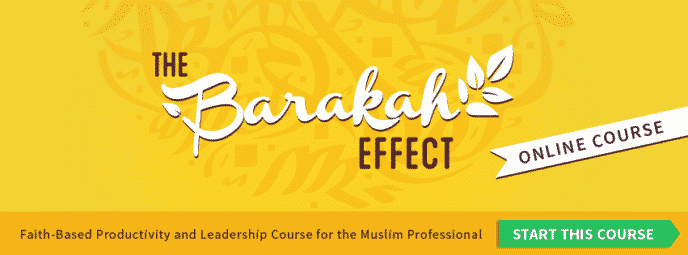
When I was in college, maghrib time would often come off during an evening class. A few of us would run out to a stairwell or outside the building and quickly pray maghrib. Surah Falaq, surah Nas, salam, and sprint back to class! You know the drill.
A few students would stay behind in class. When pushed to explain why, the answer would always be an uncomfortable shrug and mention of not wanting to miss something important.
We have a way of rationalizing behavior with extreme reach conclusions. In other words, we assess a situation, jump to the worst possible outcome, and then act accordingly. In this case, it goes something like this:
Miss 5 minutes of class → Miss something important from the instructor → Get a low grade on my exam → Get a low GPA → Unable to find a good job after graduating because of low GPA → Working a miserable job → Fall behind in my career → Ruin the rest of my life → Allah  wants me to be happy and successful → Skip maghrib today.
wants me to be happy and successful → Skip maghrib today.
“Shaytan threatens you with poverty and orders you to immorality while Allah promises you forgiveness from Him and bounty. And Allah is all-Encompassing and Knowing.” [Qur’an: Chapter 2, Verse 268]
The mindset described above is what is known as a scarcity mindset. It views the world through a lens of fear and loss. If one of our friends lands a desirable internship, a scarcity mindset makes us feel jealous and angry because we feel like we deserved it instead.
This is a trick of Shaytan as the ayah highlights. When things do not go our way, he makes us feel like we are losing control and we have to now do whatever it takes to get back on track. This is one reason people will cheat on an exam, holding the short-term fear of a bad grade over the long term consequences.
An abundance mindset is the opposite. It knows that there is not only one opportunity, and someone else’s success does not have to be accompanied by our loss. It is essentially understanding that the limits in our own head do not apply to the universe around us.
The hallmark of an abundance mindset is highlighted in the ayah above as well. Allah  promises us the bounty. This is a liberating concept. Unlike a scarcity mentality, we no longer feel the need to control everything happening around us. Instead, our strategy becomes an embodiment of the Prophetic advice when a Companion asked the Noble Prophet
promises us the bounty. This is a liberating concept. Unlike a scarcity mentality, we no longer feel the need to control everything happening around us. Instead, our strategy becomes an embodiment of the Prophetic advice when a Companion asked the Noble Prophet  :
:
“Should I secure my camel (take my own personal means), or relegate its protection to Allah
?” And the Prophet
replied saying do both – “tie your camel, and then, have tawakkul in Allah
.” [Jami’ at-Tirmidhi]
As a student, our focus should always be on the process: What are my daily habits and routines? Are my prayers in order? Am I going to class, studying, meeting with other students?
These are the actions meant by ‘tie your camel’ – and once we do so, in sha’ Allah, Allah  will bless our efforts and put barakah in them allowing us to achieve even more than we could have envisioned for ourselves.
will bless our efforts and put barakah in them allowing us to achieve even more than we could have envisioned for ourselves.
Do you think you can apply this in your life? What challenges do you face? Share with us in the comments.
If you want to learn more techniques and reach the peak of your performance spiritually, mentally and physically, consider joining “The Barakah Effect” course at The ProductiveMuslim Academy




